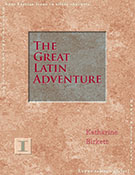 Classical pronunciation
Classical pronunciation
Classical pronunciation has a number of advantages over ecclesiastical pronunciation, so I feature the classical system in The Great Latin Adventure.
Classical pronunciation happens to be closer to the way the Romans spoke their own language—scholars have pieced together compelling clues to reach this judgment. But there are a number of additional, practical reasons to prefer classical pronunciation to ecclesiastical.
Classical pronunciation is simpler and more consistent than ecclesiastical pronunciation. This makes it easier to learn, of course, but it also makes it ideal for student-teacher communication. Because classical pronunciation is almost entirely unambiguous, students don't have to wonder what letter you are pronouncing—they will know!
On a related note, classical pronunciation simplifies spelling, too, since the sound of a word almost always tells you the spelling of a word. By contrast, ecclesiastical pronunciation has many more sounds which can be spelled more than one way, making spelling more difficult. For example, a sound like the "s" in "sit" can be spelled only with an "s" in classical pronunciation, but in ecclesiastical pronunciation, the same sound can be spelled "s" or "c", depending on what letters come next in the word. This complicates life for the student.
One additional consideration: the classical pronunciation system is frequently encountered in upper-level Latin studies outside of the Catholic school system.
The CD included with your teacher’s manual will help you learn classical pronunciation along with your child, and you and your child will enjoy the rhyming exercises and "Latin code" I introduce in Chapter 1 to make pronunciation fun.
The Great Latin Adventure also consistently uses macrons, or long signs, to help make pronunciation easy. A macron is just a horizontal line over a vowel signalling that the vowel is "long." A long vowel is pronounced differently from the corresponding short vowel. You will see the macrons if you take a look at the sample pages.
The Romans didn't use macrons, so macron use is optional—you don't need to use macrons yourself or require them of your child—but I include them for your convenience. There's a discussion of this topic in the teacher's manual for Level I.
Finally, if you’re concerned about choral music, which is sung using ecclesiastical pronunciation, don’t worry: children who know classical pronunciation adapt very readily to ecclesiastical pronunciation in a choral setting. My husband has choral experience with graduates of The Great Latin Adventure, and he’s witnessed this first hand. Students simply learn the ecclesiastical pronunciation of a choral piece one word at a time just as they learn the pronunciation of any foreign language piece. There’s no need to pass up all the benefits of classical pronunciation just to prevent a choral problem which in fact is not a problem at all.

